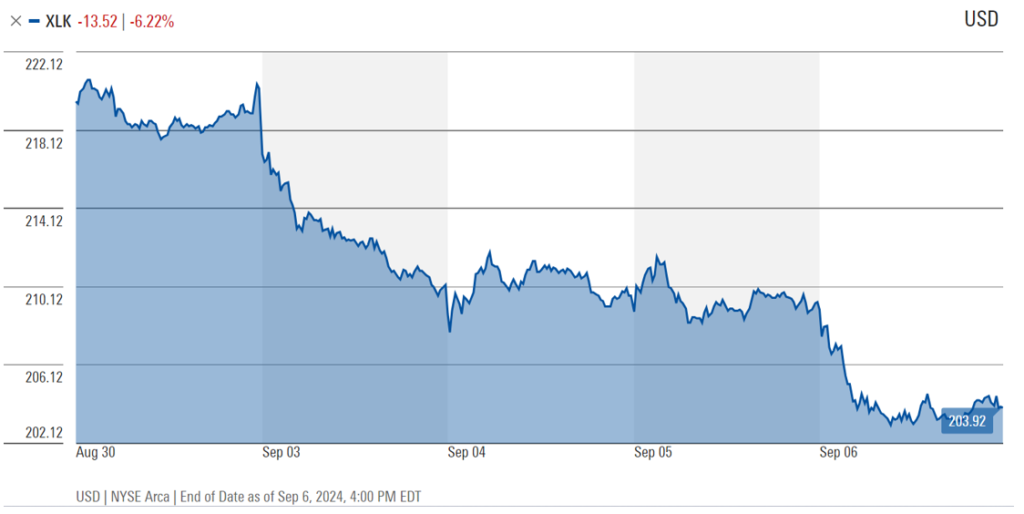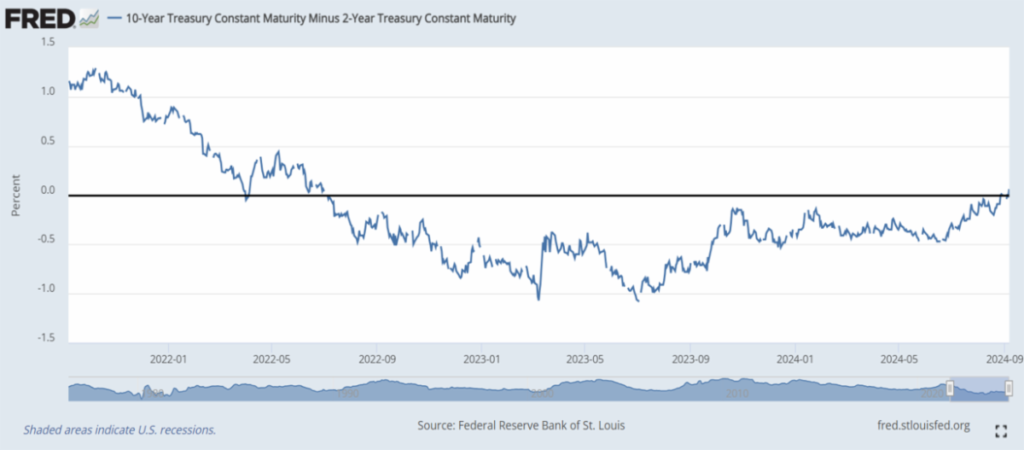What does the sharp fall over the course of a few days of tech-oriented stocks – as reflected below – represent?

The Nasdaq dropped by 5.8% between September 2nd and September 6th, and several analysts pointed out that weak economic data may point to an imminent slowdown, hence such data must be blamed for such a significant drop. The normalization of the yield curve, as shown below, may reflect the same perspective, possibly pointing to lower short-term rates between now and the end of 2025 due to foreseen economic weakness.

There is very little room to doubt the Fed’s forthcoming cuts in short-term rates starting later this month and continuing through the rest of the year. At the same time, the voices of those who advocate an overpriced and overvalued market become stronger. While we also have been questioning the overall market valuation, we cannot ignore two fundamental facts about an overpriced market, and especially an overvalued tech sector: First, such a market facilitates innovation, encourages entrepreneurship, and promotes new technologies which are necessary for higher productivity. Second, it allows the financing of otherwise non-bankable projects, which in turn, may bring in a wave of transformative technologies.
Expectations of higher earnings associated with new technologies keep pushing the market higher, however the problem is that since those future earnings have already been incorporated into the price of stocks, any small wave in expectations can shake up the market and usher in volatility and an exodus from equities.
In times like these, the voice and lessons of Epictetus are a must for investors and traders. Epictetus as a Stoic philosopher along with his disciple, the emperor Marcus Aurelius, taught us that the most important element in the pursuit of happiness is good judgment, and that is true for our individual and collective lives. The pursuit of happiness presupposes good judgement which, in turn, depends upon sound reasoning that is itself the outcome of cultivating paideia in the spirit of personal liberty and institutional freedom.
Epictetus’ life-formula for a life of liberated happiness (let’s not forget that he spent several years in slavery) was ανεχου και απεχου, translated as “endure and renounce”, which I believe is the proper recipe in times of overpriced markets which hold the promise of technological breakthroughs. In Epictetus’ teaching, the escape from being misled by fallacious reasoning is of utmost importance. In the realm of market developments, the choices between to assent or dissent the exuberance of market upswings represent the cornerstones of investment passion and financial sorrow. In every desire to assent or in every aversion decision, there is an implicit value judgement according to Epictetus. The correct judgement call should be guided by the duty to oneself and to the things that liberate oneself and those for whom s/he cares from fear. Therefore, as long as the market gyrations do not become a mechanism of fear generation, the investor and trader should endure. However, if the circumstances are such that the market gyrations become a source of fear and anxiety, the investor and trader should renounce and reduce market exposure.
Today’s underlying market developments include the economic slowdown with the subsequent earnings slowdown but are not limited to that only. The clustered portfolio positions with over-exposures in tech magnify risks which in turn could spread to other assets when the exit bell rings. On top of these concerns, we face the continuous risks in the Chinese economy, a fragmented European economy with serious issues of growth, wars in Europe, the Middle East, and in Africa while expecting a tight US election which by itself is a machine that transforms risk into uncertainty.
In the midst of these developments and from a technical standpoint, the inability of the market to experience higher highs, while lately the Dow Jones has started outperforming the S&P 500, might point to a rotation into more traditional sectors such as consumer staples and healthcare.
Historically speaking, and according to Epictetus, cultures that fail to distinguish between reality and illusions tend to either collapse or die due to an inverted institutional order that spreads apathy. Thriving markets – including thriving markets during times of risks and volatility – can be healthy elements of growth, however if they function within an inverted institutional order that cannot distinguish between real and fiat, then they could also become instruments of delusion.
